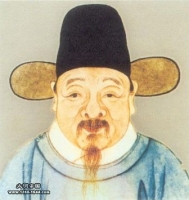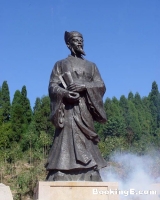| Township: | 浙江青田 |
|
Read works of Liu Ji at 散文天地 Read works of Liu Ji at 百家争鸣 Read works of Liu Ji at 诗海 | |
Career
Liu Ji served Zhu Yuanzhang in his rebellion against the Mongol-led Yuan Dynasty in China, which had ruled since the conquest of the Southern Song Dynasty in 1279. Liu Ji dabbled in many fields of statecraft, philosophy, scholarly works, and technology. His philosophical outlook was that of a skeptical naturalist, and he became interested in astronomy, calendrical science, magnetism, and fengshui. He was known to be a friendly associate of the mathematician and alchemist Zhao Yuqin, and collaborated with his contemporary general and scholar Jiao Yu to edit and compile the military-technology treatise of the Huolongjing, which outlined the use of various gunpowder weapons. He was very interested in the latter, and once said that "thunder is like fire shot from a cannon".
Early Service in the Yuan Dynasty
Liu Ji earned his Jinshi degree in the final years of the Mongol Yuan Dynasty, and spent much of his early career attempting to save the dynasty from collapse. Liu served the Yuan as an official for 25 years, gaining a reputation for integrity and honesty, and became known as a distinguished scholar and strategist. In 1348, Liu was appointed to a military position and assigned to put down a southern rebellion against the dynasty. The leader of the rebellion attempted to save himself by offering Liu a bribe. When Liu refused, the rebel went to Beijing and succeeded in bribing his way into favour there.
Once the secessionist had bribed his way into the regime's favour, he was given a public office and a salary. Liu Ji's relationship with the Yuan deteriorated after this event. Liu attempted to resign twice, in 1349 and 1352. He was demoted in 1358, and finally left service to retire in his ancestral homeland. In 1366, when he was fifty-five, Liu was introduced to Zhu Yuanzhang, a former leader of a radical White Lotus Buddhist rebellion who was then the leader of a broad anti-Yuan rebellion.
Service to Zhu Yuanzhang
Liu Ji served not only in the administration of Zhu Yuanzhang, but also in many battles as a commanding officer on land and water, leading the early Ming naval forces. Zhu Yuanzhang placed Liu Ji in charge of the campaign to conquer all of Zhejiang from Yuan forces. Liu was also responsible for military ventures against opposing Chinese rebel groups, as well as coastal Japanese pirates. His forces owed much of their success to the use of the medieval Chinese firearm known as the fire lance. It was during this period that he wrote the books Extraordinary Strategies of a Hundred Battles (百戰奇略) and Eighteen Strategies and Affairs (時務十八策). Later in the rebellion Zhu only rarely relied on Liu to personally command his armies in the field, as he acquired other capable generals, including Xu Da, Deng Yu and Chang Yuchun. Liu was most often consulted for his strategic advice during this period.
In 1368, after eight years of Liu Ji's service, Zhu Yuanzhang unified China. When Zhu founded the Ming Dynasty, Liu was one of his most trusted advisors, but the relatiohship between Zhu and Liu eventually deteriorated in a manner similar to the way that Liu had become estranged from the Yuan government. In 1375, Liu rejected a man, Hu Weiyong, for appointment to high office. Hu later obtained an audience with Zhu Yuanzhang and slandered Liu by telling Zhu that Liu was plotting to establish his own power. After convincing Zhu of Liu's treachery, Liu was ejected from office, and Hu Weiyong was promoted.
Death
The shock and shame of being groundlessly dismissed from office destroyed Liu's health, and he quickly died. Within five years of Liu's death the man who had slandered Liu to achieve office was himself suspected of plotting against Zhu Yuanzhang. In the subsequent orgy of Zhu's paranoid efforts to root out conspiracy, 30-40,000 people were executed.
The precise cause of Liu Ji's death is considered uncertain by modern scholars. Some scholars believe that Liu was poisoned by emperor Zhu Yuanzhang himself, not because Liu failed his duty, but because the emperor was envious and even fearful of his knowledge and influence. Other sources have pointed out that the emperor did kill many people shortly after Liu lost his official position, but they are uncertain about whether Liu was part of this group.
Prophecy
Liu Ji's most famous prophecy to Zhu Yuanzhang, written down in a lyrical style, is called the Shaobing Song (燒餅歌). The poem is written in cryptic verse and is difficult to understand. Some people believe that the Shaobing Song has predicted future events in China, including the 1449 Mongol invasion, and the 1911 founding of the Republic of China.
Biographical work
Liu Ji's official biography is found in the 128th chapter of the Ming Shi. The author Chong Tai also wrote a biography on him.
In popular culture
Shenji Miaosuan Liu Bowen (simplified Chinese: 神机妙算刘伯温; traditional Chinese: 神機妙算劉伯溫; pinyin: Shénjī Miàosuàn Líu Bówēn; literally "The Divine Witted and Marvelous Predictor Liu Bowen"), a 404 episodes long television drama about Liu Bowen, was aired on Taiwan's TTV from 23 August 2006 to 12 March 2008, starring Taiwanese actor Huang Shaoqi (黃少祺) as Liu Bowen.

